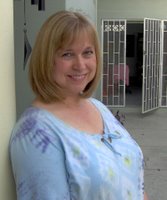Hi! My name is Aneida. You'd be smiling too if, like me, the Lord was doing so many incredible things in your life. Where do I begin to give Him thanks?
--Jesus saved me...
--I was recently baptized in a nearby river...
--the man I was living with got saved too...
--he stopped his drinking and carousing and decided to marry me...
--my mom and dad get saved, baptized and married too...
--I saw my alcoholic dad stop drinking the day he accepted Christ...
--I helped my mom lead my older sister to the Lord (daddy got to baptize her in the river last month!) ...
--we started a new church in our living room with dad leading the gatherings (see photo below) That may not sound like a big deal, but less than a year ago my dad was known by everybody as the local neighborhood drunk...today people seek him out for spiritual help and counsel!
--my husband now goes with me faithfully every week to disciple my sister-in-law who just made her own profession of faith in Christ...
--we are working alongside my mom and dad and are close to starting two other new house churches with people we have won to the Lord and are discipling...
Can you believe all the above happened in just the first six months of this year? I can't wait to see what God will do the second half of this year!
This is our church. We meet in the living room of my mom and dad's house. Most of the people here are related family. BTW, the man with the checkered shirt is my abuelito (grandpa), he recently got saved too! Right now we're working on my brother-in-law who has a bad alcohol and drug problem. Will you guys help us pray for him?
This is one of my friends (on the left). She hasn't accepted the Lord--YET--but we are praying for her salvation too. This picture was taken as the Good News was being shared with her one afternoon. You can see the comprehension of the Gospel in her eyes as she finally understood for the first time how much God truly loves and accepts her. Pray that she too will soon find the peace and joy that comes from giving her heart to the Lord. The lady on the right was God's instrument to lead my mom, dad, and myself to the Lord. We love her very much!


